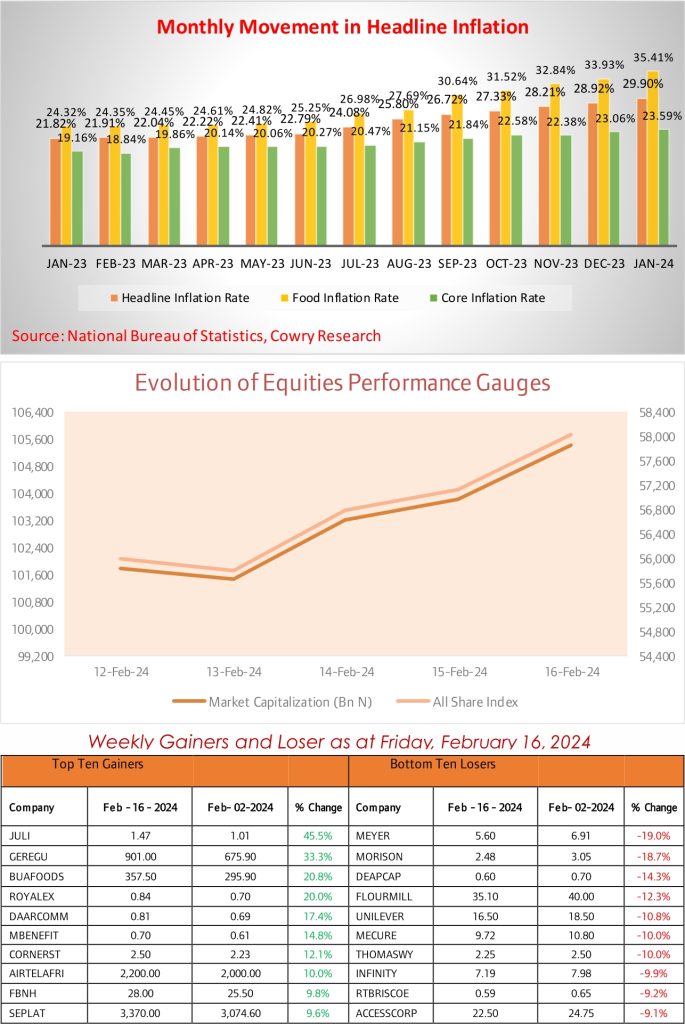ECONOMY: Inflation Kickstarts 2024 with Pangs; Routes to 29.90% at 28-Year High….

This week, the National Bureau of Statistics (NBS) published the latest monthly consumer price inflation data which indicates that the headline inflation rate increased for the thirteenth consecutive months to 29.90% in January 2024, reflecting an increase of 0.98% points when compared to the December 2023 headline inflation rate of 28.92%.
The current inflation rate in January 2024 represents a 28-year high, surpasssing the 29.51% recorded in July 1996. This persistent surge remains above the Central Bank of Nigeria’s target range of 6% to 9%, driven by anticipated price hikes following the removal of premium motor spirit (PMS) subsidies. The inflationary pressures stem from various sources, including escalated costs of transportation, adverse impacts of climate change on food production, domestic security challenges, the Russia-Ukriane war and the prolonged depreciation of the Nigerian Naira against the US dollar in the foreign exchange market.
Major contributors to the acceleration in the headline index include food and non-alcoholic beverages, constituting over 51% of the total 29.90%. Other contributing factors include housing and utility items, clothing and footwear, transportation costs, educational and health amenities costs, accounting for 17%, 8%, 7%, 3.95%, and 3.0% respectively. Regardless, the continued depreciation of the local currency has continued to exert significant pressure on the core component of Nigeria’s inflation basket due to the country’s reliance on imported items.
Nigeria’s headline inflation reading has maintained an upward trajectory since December 2022, partly due to structural challenges in the agricultural sector, which has resulted in supply constraints in the food sector. Meanwhile, food inflation continued to play a significant role, reaching 35.41% year-on-year in January 2024, which was 11.10% points higher compared to January 2023 rate of 24.32%. Factors driving food inflation included increases in the prices of bread and cereals, potatoes, yam and other tubers, oil and fat, fish, meat, fruit, coffee, tea and cocoa. Other contributing factors included flooding, insecurity in agricultural areas, and disruptions in global food supply chains due to the ongoing war in Ukraine.
Core inflation, excluding volatile agricultural produces and energy, stood at 23.59% in January 2024 on a year-on-year basis, up by 4.71% points from the 18.88% recorded in January 2023. This increase was driven by higher prices in passenger transport by road and air, medical services, actual and imputed rentals for housing, pharmaceutical products, and accommodation service.
Month-on-month, we note that all three measures of inflation rose sharply. Thus, the headline inflation rate climbed to 2.64% month-month, up from 2.29% m/m, food inflation rose to 3.21% month-on-month (vs. 2.72% month-on-month in December), while core inflation increased to 2.24% month-on-month from 1.82% in the prior month.
In January 2024, the year-on-year All Items inflation rate exhibited regional variations, with Kogi (35.79%), Oyo (34.58%), and Akwa Ibom (33.16%) experiencing the highest rates, while Borno (22.57%), Taraba (24.83%), and Benue (26.64%) recorded the slowest rise in Headline inflation. On a Month-on-Month basis for the same period, Ondo (3.79%), Osun (3.77%), and Jigawa (3.58%) saw the highest increases, contrasting with Bayelsa (0.45%), Yobe (1.10%), and Ogun (1.35%), which recorded the slowest rise in Month-on-Month inflation.
Regarding Food Inflation in January 2024, the Year-on-Year basis displayed disparities across regions. Kogi (44.18%), Kwara (40.87%), and Rivers (40.08%) reported the highest Food inflation rates, while Bauchi (28.83%), Adamawa (29.80%), and Kano (30.08%) recorded the slowest rise. On a Month-on-Month basis for Food Inflation, the highest increases were observed in Ondo (4.69%), Osun (4.59%), and Edo (4.58%), while Bayelsa (0.24%), Yobe (0.97%), and Ogun (1.44%) experienced the slowest rise in inflation.
The marked rise in headline inflation in January signals the expectation for continued elevated price levels partly due to structural challenges in the agricultural sector, which has resulted in supply constraints in the food sector. Recently, the federal government took immediate actions on the need to create a commodity board as a means to tackle inflation and food crisis. This move, may not yield the desired results on the economy considering previous attempts to mitigate rising costs. The high inflation rate has had a significant negative impact on the Nigerian economy and the lives of ordinary Nigerians; eroded purchasing power, led to increased poverty, and dampened economic growth.
The MPC is set to meet later this month and given the unabating rise in inflationary trend, a tightening measure is expected to combat the high inflation by a modest 25-75bps. Regardless, Cowry Research foresee a continued rise in headline inflation in the month of February to 32%.
EQUITIES MARKET: Equity Investors Book Weekly Gains of N2.1 trillion Amidst Attractive Fixed Income Yeilds….
This week, the benchmark index reversed it loss from last week as it rebounded by a substantial 3.79% week-on-week to anothert new historic high of 105,722.78 index points, on mixed sentiment and low trade volumes despite positioning in the bellwether stocks which drove activity. Consequently, the year-to-date (YTD) return of the index settled at 41.39%, and further contributing to a 3.79% weekly rise in the market capitalization of listed equities to N57.85 trillion. This resulted in a total of over N2.1 trillion gain being added to the wealth of market investors.
In the just concluded week, the level of investor sentiment was shaky as market players digested the latest inflation figures which came at 29.90% in Janauary coupled with the expectation for a continued increase in money market rates at the primary auctions which will render the equity markets as an unattractive investment option for investors.
Consewuently, the level of trading activity this week was in a lacluster as investors’ sentiment levels reflected negative market breadth. As a result, the weekly total traded volume decreased by 37.06% week on week to 1.56 billion units, with the number of trades nosediving by 22.62% week on week to 42,546 deals. In the same vein, the weekly traded value plunged by 23.74% to N36.50 billion.
Sectoral performance for the week exhibited a mixed trend, with two out of five sectors experiencing sharp downturns. The Banking and Industrial indexes bled with losses, declining by 1.34% and 1.83%, respectively. This was primarily driven by price drops in key stocks such as ACCESSCORP, GTCO, WAPCO, and RTBRISCOE. On the contrary, the Insurance, Oil & Gas, and Consumer Goods indexes, recorded gains of 2.66%, 10.96%, and 5.25% week-on-week, driven by strong demand and positive price movements in GEREGU, AIRTELAFRI and SEPLAT.
Top-performing stocks at the close of the week included JULI (+46%), GEREGU (+33%), BUAFOODS (+21%), AIRTEL (+10%) and FBNH (+9.8%). On the flip side, stocks like MEYER (-19%), MORISON (-18%), DEAPCAP (-14%), FLOURMILL (-12%), and ACCESSCORP (-9%) experienced declines in their share prices, respectively.
In the upcoming week, Cowry Research anticipates a mixed trend of market activities as the recently published inflation data permeates the market with portfolio rebalancing by investors and fund managers seeking alpha in the market as well as the expectations from the fixed income market. However, a pullback at this juncture is expected to strengthen upside potential. Amidst all these, we continue to advise investors to take position in stocks with consistent track records of dividend payments and strong fundamentals and growth prospect to support earnings growth.



